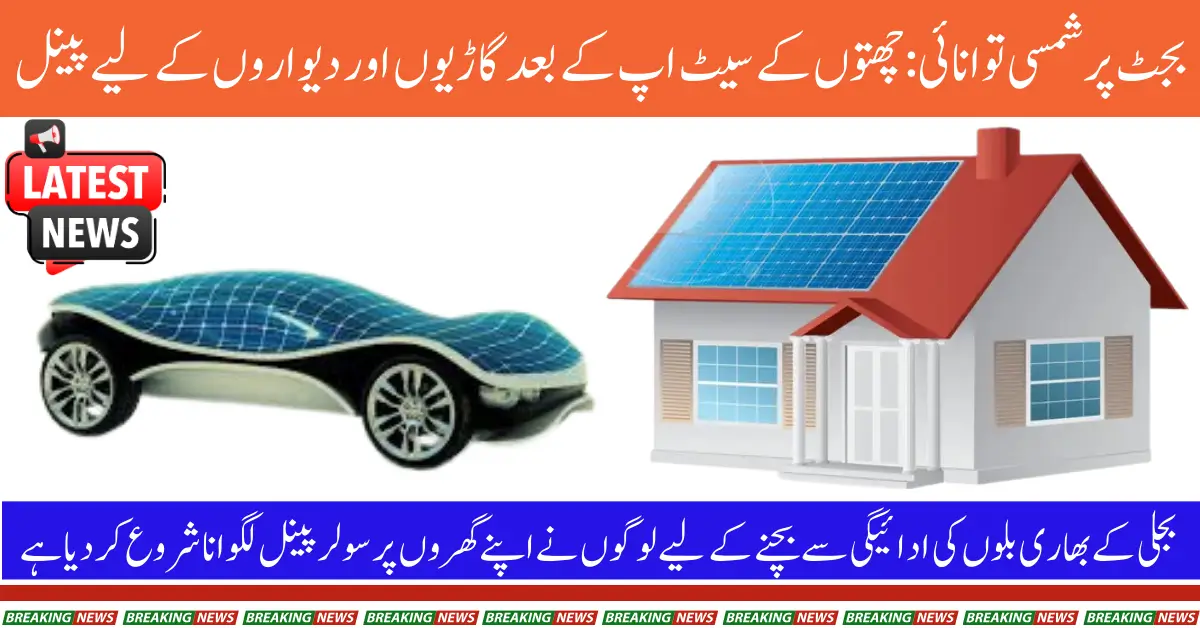Table of Contents
Solar Panels for Vehicles
Solar Panels for Vehicles and Walls After Roof Setup. Due to hefty electricity bills, lives have become hectic for people from various strata. This situation prompted them to install solar panels in their houses. Thus, the task becomes much easier while decreasing the issues regarding monetary difficulties. Nowadays, with the rate at which solar panel trends are picking up, various countries worldwide and in Pakistan also face it.
Solar Panel Installation in Pakistan
Due to the energy crisis and heavy electricity bills in Pakistan, the installation of solar panels is increasing. Citizens are getting significant reductions in electricity costs by installing solar panels on the roofs of their houses. Energy obtained during the day can be saved through solar panels and consumed at night, which further contributes to energy conservation.
Recent Innovation of Solar Panels in Japan
Other countries are installing solar panels on their rooftops, in Pakistan, but Japan has provided this technology in a more modern form. The Japanese experts have now begun to work on a plan to install solar panels on walls and the roofs of cars as well. Media reports claim that in 2009, Japanese scientists created solar panels from perovskite metals. Now, with the help of these same metals, more modern and efficient solar panels are being made that have forty percent efficiency in generating electricity from the sun.
1.6m People in KP Register for free Solar System Scheme
Perovskite Solar Panels Compared to Traditional Solar Panels
Traditional solar panels are usually made from crystalline silicon, which has an efficiency of between 15 and 30 percent in terms of price. In contrast, perovskite solar panels are capable of generating electricity from the sun with forty percent efficiency. This difference makes them more efficient.
Japanese Company Sekisui Plan
A Japanese company by the name of Sekisui has recently announced that it will soon start manufacturing perovskite solar panels. It hopes to install such panels on building walls, on roofs, in fields, and on the roofs of cars over the next five years, where it would hope to produce 20,000 megawatts of electricity.
Health Advisors are Available at All Hospitals on the Health Card Panel

China’s Comparative Advantage
Although Japan takes the first position in this technology, China will soon take the world’s leadership position in the production of perovskite solar panels. This is attributed to the fact that large quantities of the major raw materials to produce perovskite such as tin and lead are available.
10,500 Support Now Available for Previously Ineligible Candidates: BISP Update
Perovskite Solar Panels
Compared to traditional silicon panels, perovskite solar panels have the following benefits:
- Low cost: They can be produced at a very low cost.
- Ease of manufacture: Their production process is quite simple.
- Performance in weather conditions: They are able to produce more electricity even in low-sun and rainy seasons.
- Flexible design: Due to their flexibility, they can be installed on walls, car roofs, and other places.
Opportunities for Pakistan
This technology provides a huge opportunity for countries like Pakistan, where the major problem is an energy crisis and expensive electricity. The government and private sector must invest in this innovative technology and promote solar energy to meet the energy needs of the country.
Environmental Benefits
Solar panels have economic benefits while also enhancing environmental benefits. They help in the reduction of carbon emissions and make it possible to promote renewable energy sources.
BISP 8171 Revolutionary Program For Online Registration Check
Conclusion
The best solution to high electricity bills is installing solar panels. Japan’s plan to manufacture perovskite solar panels and install them on walls and vehicle roofs marks the beginning of a new era for this technology. Pakistan must also be allowed to enjoy this innovative technology to get rid of the energy crisis and improve people’s lives.
